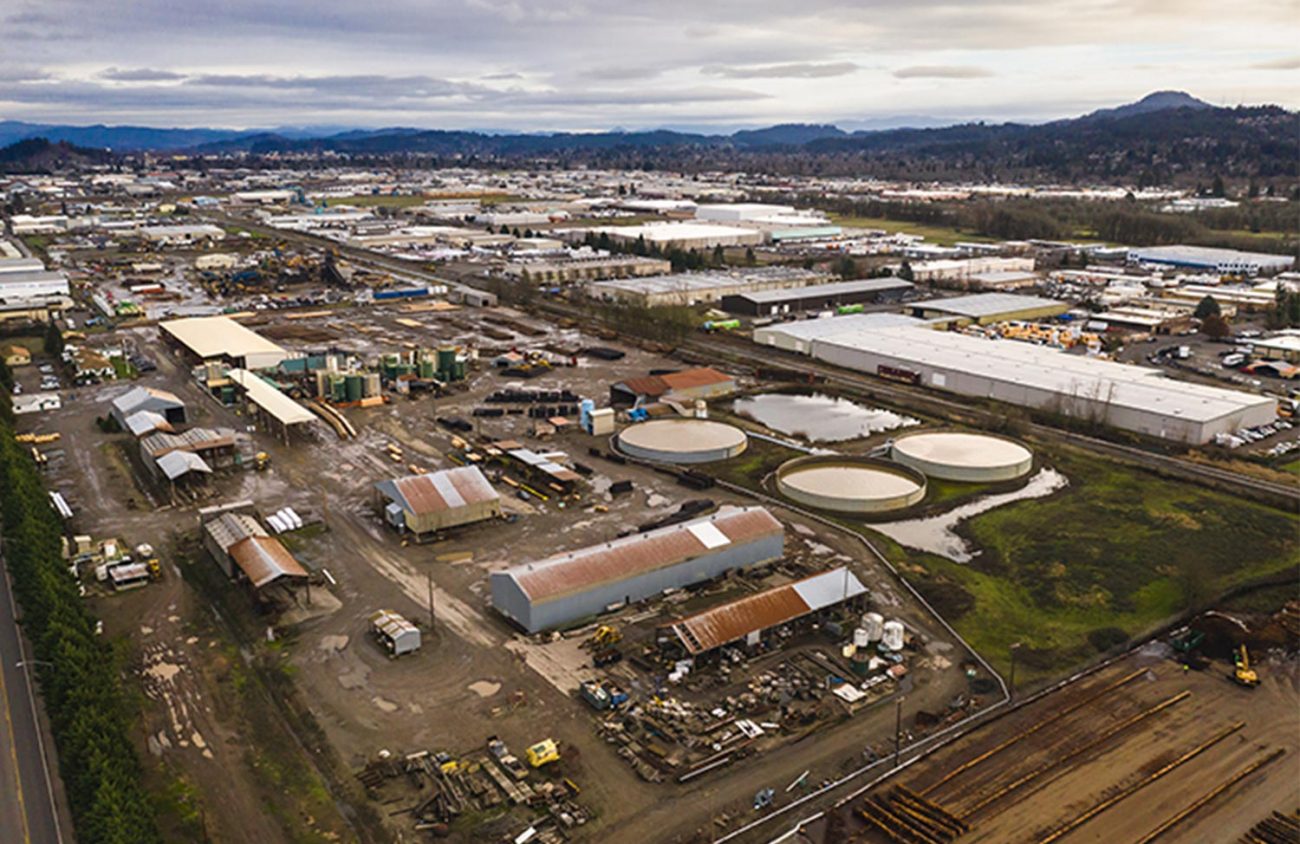In the last few years, the owners of J.H.Baxter & Co.’s west Eugene wood-creosoting factory seemed destitute.
They saved money by not replacing old, broken-down pollution-control equipment for treating the factory’s toxic wastewater. Instead, the company illegally boiled off hundreds of thousands of gallons of the nasty stuff directly into the air, the fumes wafting toward nearby homes in the Bethel neighborhood.
And in 2022, Baxter shut the heavily contaminated 31-acre factory, laid off its workers and stopped paying property taxes. It was state and federal regulators, using taxpayer dollars, who stepped in to begin the cleanup.
Yet last week, Baxter and its president and owner, Georgia Baxter-Krause, quickly whipped out an astonishing sum — more than $1 million — to pay fines to settle federal criminal environmental charges that posed the threat of serious prison time for Baxter-Krause.
A federal judge last week fined the company and Baxter-Krause a total of $1.5 million for breaking air-pollution laws. They promptly paid about $1.1 million of that, court records show, with a promise to pay the rest later.
How could a company apparently so broke suddenly come up with so much cash?
The answer: J.H. Baxter, while operationally defunct, still owns potentially valuable real estate in Central and Southern Oregon and in California, new court filings show. To raise money to pay the anticipated fine, the company in January sold property it owned in Arlington, Washington, says an April 17 memorandum filed in federal court by Baxter-Krause’s lawyer.
The next chapter in the Baxter saga will include seeing how far Baxter’s real estate assets go toward the cleanup at the Eugene factory, plus possible compensation in pending civil class-action lawsuits to residents claiming harm from the plant’s fumes. Given the severity of the mess, the assets may not go far. Federal and state agencies say they have spent nearly $14 million to date on and around the site. The total tab for cleaning up a wood-treating factory typically runs $50 million to $100 million, says the federal Environmental Protection Agency.
Tracts of timberland
The Eugene plant was the last operation of a business founded 129 years ago that once ran factories in four states, says the memo from Baxter’s lawyers. The company continues to own a Weed, California, property on which it collects rent, the memo says.
Plus, J.H. Baxter owns seven parcels of land in Central and Southern Oregon, according to state filings in a recently resolved civil lawsuit. In that case, the state alleged the company had improperly tried to shift the land out of reach of regulators.
Those parcels are mostly timberland, says Oregon Department of Environmental Quality spokesperson Dylan Darling. The agency does not know their acreage or value, he says.
The land will be used “for the benefit of the company’s creditors, including the DEQ,” Darling says. Baxter owes the DEQ $2.7 million for the agency’s testing and clean-up work at and around the factory, he says.
The company also owns the 82-year-old Eugene factory site — although that is a liability. “Because of the historical environmental contamination at the Eugene (factory) and the regulatory scrutiny it has faced, J.H. Baxter has been unable to sell the Eugene facility,” Baxter’s lawyer wrote to the court.
The EPA is in charge of the factory cleanup. It has spent $11 million thus far, says agency spokeswoman Alice Corcoran. That has included removing about two dozen massive storage tanks and more than 500,000 gallons of chemicals that J.H. Baxter left at the site.
“This site is complex and we do not have an estimated cost for cleanup of the site at this time. Cleanup costs for wood treating sites typically range from $50 million to $100 million, but some sites can be much higher depending on the extent of contamination,” Corcoran tells Eugene Weekly.
Baxter seeks to have its “limited and declining assets” used for the cleanup, says the legal memo from Baxter-Krause’s lawyer.
No restitution
The fine paid by the company and Baxter-Krause will go to the federal Crime Victims Fund that distributes the money to government and other programs to help victims, federal prosecutors say in a memo to the court. Consultants determined last year there was insufficient proof that fumes from the factory harmed neighbors, the memo said. So, the fine money can’t be paid out as restitution to them, the memo says.
Ninety days
To punish Baxter-Krause for violating air-pollution laws, the federal judge last week ordered her to serve 90 days in federal prison. Some neighbors were deeply unhappy at what they saw as a light penalty. Baxter-Krause’s lawyer had argued for no prison time. Federal prosecutors, in a sentencing memorandum, said federal guidelines suggested 12 months.
Baxter-Krause had reluctantly worked at the company for years at the request of her father, who headed the firm, her lawyer’s sentencing memorandum said. Following her father’s death, she grudgingly became president in 2001, the memo said.
Baxter-Krause’s portion of the total federal fine was $500,000, the maximum allowed for her violations, the prosecutors’ memo said. Last week’s payment covered $250,000 of that, according to court filings. Baxter-Krause lives in Bend, where she owns a house valued at about $800,000, according to Deschutes County records.
Baxter-Krause’s lawyer did not respond to questions from Eugene Weekly.
Successful lawsuit
Meanwhile, Oregon regulators last month succeeded in overturning what they described as an improper attempt by Baxter to shift away assets in 2015, as the company’s liabilities escalated for soil, groundwater and air pollution at the Eugene factory. That year, the company transferred ownership of its seven parcels of timberland in Josephine and Jackson counties to three new business entities Baxter-Kruse had created, the state said in a lawsuit against her last year. Baxter-Krause didn’t contest the allegations. A state judge earlier this month nullified the 2015 transfers.
“We have a state court judgment reversing/voiding the fraudulent transfers,” DEQ’s Darling says in an email.
But the list of claimants for Baxter’s assets is long: the DEQ, the EPA, many neighbors, and even the Lane County tax assessor. The company’s back-tax bill now totals several hundred thousand dollars, county records show.
Bricks $ Mortar is a column anchored by Christian Wihtol, who worked as an editor and writer at The Register-Guard in Eugene 1990-2018, much of the time focused on real estate, economic development and business. Reach him at Christian@EugeneWeekly.com.
A Note From the Publisher

Dear Readers,
The last two years have been some of the hardest in Eugene Weekly’s 43 years. There were moments when keeping the paper alive felt uncertain. And yet, here we are — still publishing, still investigating, still showing up every week.
That’s because of you!
Not just because of financial support (though that matters enormously), but because of the emails, notes, conversations, encouragement and ideas you shared along the way. You reminded us why this paper exists and who it’s for.
Listening to readers has always been at the heart of Eugene Weekly. This year, that meant launching our popular weekly Activist Alert column, after many of you told us there was no single, reliable place to find information about rallies, meetings and ways to get involved. You asked. We responded.
We’ve also continued to deepen the coverage that sets Eugene Weekly apart, including our in-depth reporting on local real estate development through Bricks & Mortar — digging into what’s being built, who’s behind it and how those decisions shape our community.
And, of course, we’ve continued to bring you the stories and features many of you depend on: investigations and local government reporting, arts and culture coverage, sudoku and crossword puzzles, Savage Love, and our extensive community events calendar. We feature award-winning stories by University of Oregon student reporters getting real world journalism experience. All free. In print and online.
None of this happens by accident. It happens because readers step up and say: this matters.
As we head into a new year, please consider supporting Eugene Weekly if you’re able. Every dollar helps keep us digging, questioning, celebrating — and yes, occasionally annoying exactly the right people. We consider that a public service.
Thank you for standing with us!

Publisher
Eugene Weekly
P.S. If you’d like to talk about supporting EW, I’d love to hear from you!
jody@eugeneweekly.com
(541) 484-0519
